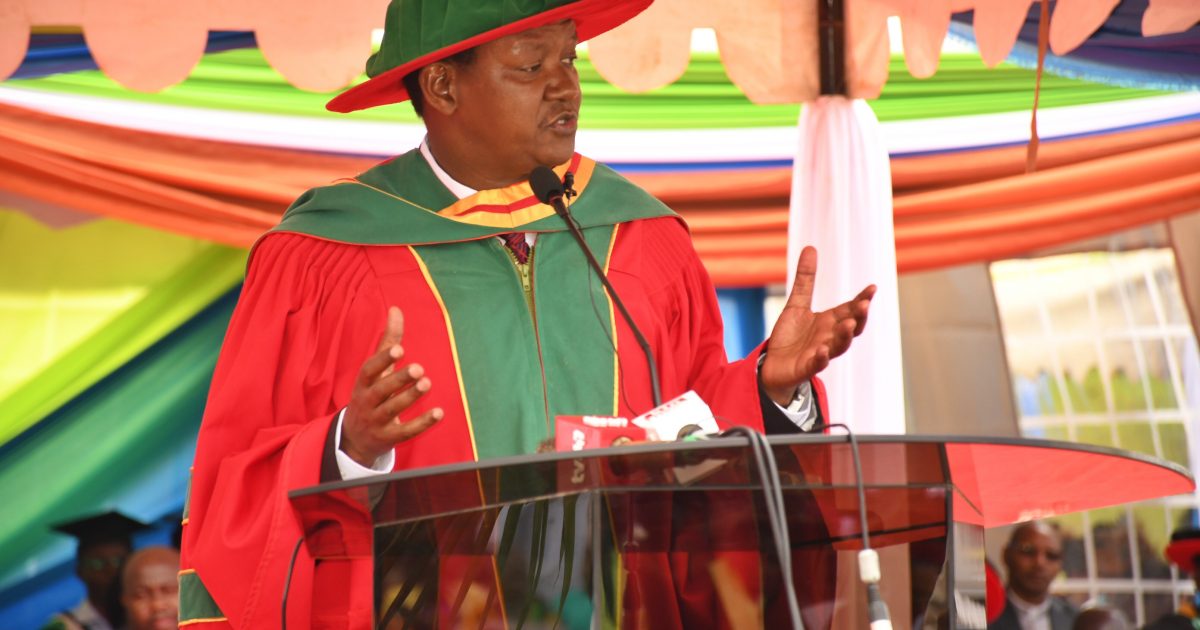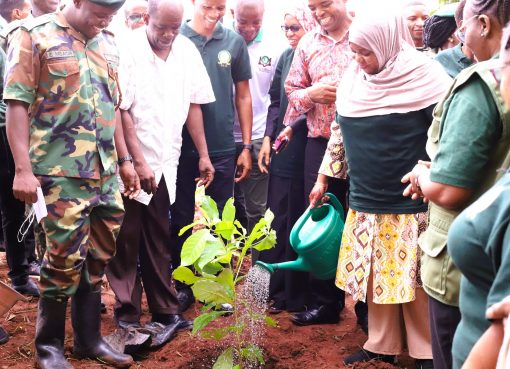Ministry of Tourism and Wildlife Cabinet Secretary Alfred Mutua has reiterated his commitment to turn around the fortunes of the tourism industry in order to create much-needed job opportunities for thousands of graduates in the country.
Dr. Mutua said he is pushing for reforms in the sector to allow for the creation of decent jobs in the sector to match the number of graduating students in order to mitigate the high number of unemployed youths in the country.
“In the next one to two years, the tourism and wildlife sectors will create decent job opportunities to match the number of graduates from our institutions as a result of the reforms we are undertaking,” the CS said.
The CS was speaking in Naivasha during the Wildlife Research and Training Institute’s (WRTI) 21st graduation, where a total of 376 Graduands were awarded Diplomas and Certificates in fields of Wildlife, Environment, Fisheries and Aquatic Sciences, and Tourism and Hospitality.
Dr. Mutua advised the graduates to be resilient and adapt to the skill demands of the industry and added that the government recognises the value of education as a key driver of economic development.
“The realisation of the learner-centered approach has seen the government transform our education system to the competent-based curriculum (CBC) in a move aimed at developing skills for innovation, employment, and creativity. Through the Bottom-Up Economic Transformative Agenda (BeTA), the Government is already recognising skills and talent and creating jobs for skilled youths in the country, and this institute is therefore well positioned as a Technical Vocational and Educational Training (TVET) and an enabler of realisation of this goal,” Mutua said.
He at the same time urged WRTI to continue investing in research and observed that, as a research institute, it ensures that the research that is being done adds value to training through factual dissemination of information.
“Training, on the other hand, should also add value by building the capacity of upcoming researchers and conservationists by developing curricula that address the current needs of the sector and, through it, inculcate the necessary skills and attitudes. In view of this, I wish to encourage the management to create an environment where researchers can train and trainers can also undertake research so that there is no disconnect between the two functions,” the CS advised.
He also called on the institution to hasten the review of its Strategic Plan to realign it to BeTA and the Medium-Term goals and also develop a strategy that will help them deliver on their mandate, and he promised that his Ministry will support the institute in realising its mandate by mobilising and availing resources for infrastructural and personnel improvement.
The WRTI Director, Dr. Patrick Omondi said they had finalised conducting a Training Needs Assessment to inform a planned review of their Curriculum to make it relevant to the changing market needs and expand their niche by developing new programmes.
He observed that they are still in the early developmental phase and have several notable challenges, including limited infrastructure and human resources and a lack of financing for their students by the Higher Education Loans Board.
But Dr. Omondi revealed that they have taken several measures as a stop-gap measure to address these challenges as they seek more resources and noted that the Board recently approved a Scholarship Policy, Work Study Policy and fees reduction for Certificate Courses by over 30 percent. He however, noted that this is not enough and called upon the office of the Cabinet Secretary for more support including linkages with development partners.
The Director stated that on the research front, the Institute has made huge steps including securing seed funding from the National Government to establish a comprehensive wildlife database; priority assessment of the exploiting Carbon & Biodiversity credit market; Land use land cover changes (LULCC) and degradation in the Tsavo – Amboseli Ecosystem (1980 – 2022) and Mapping Biodiversity Hotspots and Identification of threats to Marine Species of concern in Kwale County and Tana primates among other researches.
Dr. Omondi disclosed that the Institute is leading a consortium of scientists and conservationists from Kenya and Europe, including the Kenya Wildlife Service (KWS), Ol Pejeta Conservancy, Institute of Zoo and Wildlife Research Berlin, Germany, Zoo Dvur Kralove (ZooDK) and Laventea Lab of Italy, that is undertaking cutting edge research to save the Northern White Rhino from extinction, where only two females remain in the world and are in Ol Pejeta.
The board chair of the institute, who is also the former governor of Kajiado County, Dr David Nkedienya, said despite the notable progress, the Institute requires additional investment in capital and human resources to achieve its mandate in Research and Training as provided for in the Wildlife Conservation and Management Act, 2013.
He said they had already undertaken a Feasibility Study giving a Master Plan for the needed infrastructure at the Headquarters and its Field Research Centres and requested the ministry to help them secure funding for the construction and equipping of the Modern Headquarters, Convention Centre, Forensic and Genetic Laboratories, and additional Training Infrastructure.
Dr. Nkedienye also called for a review of current policy of not advancing HELB loans for Institutions not under the Ministry of Education, particularly trainees placed at the institute by the Kenya Universities and Colleges Placement Services (KUCCPS) in order for the institute to remain competitive and continue building the much-needed capacity in the wildlife sector.
By Mabel Keya – Shikuku




